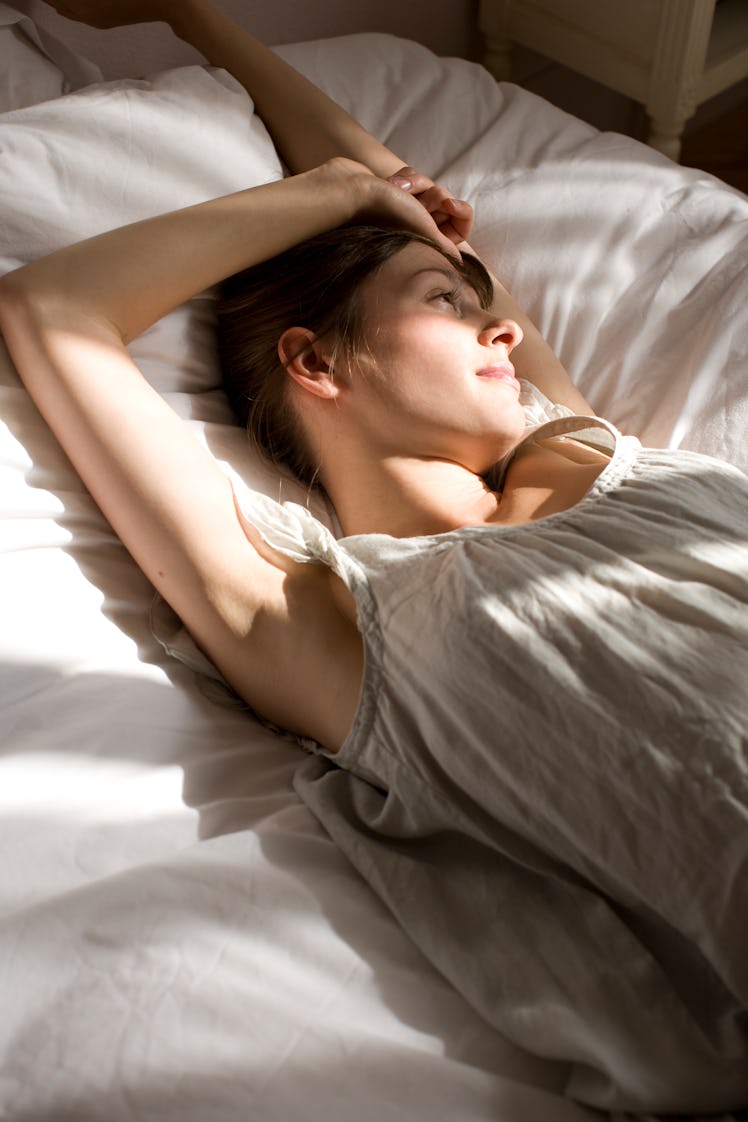
Here’s The 1 Thing To Watch Out For If You Love Sleeping With A Humidifier
The phrase “too much of a good thing” can apply.
I hate the feeling of waking up absolutely parched, especially on mornings when my lips are particularly dry and cracked. Many of my friends prevent this by sleeping with an air humidifier on in their room. But as a person who has a very low tolerance for outdoor humidity and a very high fear of mold, I couldn’t help but be a bit skeptical about their suggestion to get one for myself — at least until I found out whether it’s safe to sleep with a humidifier at night.
There are a multitude of factors that can cause or contribute to skin dryness, one of which is dry air, according to Dr. Clifford W. Bassett, the medical director of Allergy & Asthma Care of New York and the author of The New Allergy Solution. One of the benefits of air humidifiers is that they’re designed to combat this. To add humidity to their surroundings, air humidifiers eject moisture into the air, and that moisture eventually goes on to hydrate your skin, lips, eyes, etc., so that’s one point in favor of getting an air humidifier for my space.
While you can of use air humidifiers year round for this purpose, they’re especially useful in the cooler months. When you shut your windows and crank up the heat, you’re actually filling your homes with dry heat, which makes it near impossible to attain that dewy-skin look. Thankfully, Bassett says “moisturization from a humidifier can help alleviate” some of that dryness.
Whether you should sleep with an air humidifier really depends on your specific needs, according to Dr. Benjamin Smarr, a National Institutes of Health postdoctoral fellow at UC Berkeley and Reverie sleep advisory board member. For example, Smart tells Elite Daily that if you snore a lot — which is a sign you’re breathing more through your mouth than your nose — you might benefit from sleeping with a humidifier, because this kind of mouth breathing can actually cause a variety of dental problems. "It can lead to drying out your mouth and throat, potentially giving you a cough and dental issues associated with dry, sad gums," says Smarr. "So in that case, a humidifier could be very helpful."
How To Safely Use An Air Humidifier
Before you go installing an air humidifier in your room and blasting it every night while you sleep, it is essential you familiarize yourself with how to use — and how to care for — your specific air humidifier. First, you need to be careful about the kind of water you're putting into your humidifier. In all likelihood, your humidifier will call for distilled or demineralized water, not regular old water from the sink. “Tap water with high levels of minerals can increase bacteria growth, resulting in a white dust and additional irritation to your sinuses,” says Bassett. The Environmental Protection Agency echoes this warning, adding, “Breathing mist containing these pollutants has been implicated as causing a certain type of inflammation of the lungs.
You also need to make sure you’re regularly emptying your air humidifier’s water about every three days, per the Mayo Clinic, and giving the machine a really thorough cleaning at the same time. “Don’t forget to clean and wipe the lid and inside of the humidifier reservoir and to sanitize the unit on a regular basis,” says Bassett. “This will help reduce and minimize the possibility of buildup of mold spores and bacteria. It is also important to clean and change the filter in the humidifier on a regular basis, so mold does not grow in the unit and blow into the home.”
What To Watch Out For If You’re Sleeping With A Humidifier
Once you’ve got your air humidifier hygiene down, you still need to practice moderation, because when it comes to using these remarkable little machines, the phrase “too much of a good thing” can apply. Namely, it’s possible for an air humidifier to inject too much moisture into the air, which can, again, promote the growth of mold.
“When an excessive level of moisture occurs, it can encourage mold spores to grow on various surfaces in the room,” Bassett says. “Higher levels of moisture can additionally create a more friendly environment for house dust mites to flourish and may also pose a concern for asthmatic individuals.” To make sure this doesn't become an issue for you, the U.S. Consumer Product Safety Commission (CPSC) recommends that you regularly check the humidity level in your apartment to make sure it's not too moist; ideally, you want your indoor humidity levels to fall between 30 and 50 percent, per the EPA. To measure the air moisture in your home, you can use something called a hygrometer, which the CPSC says you can find at your local hardware store.
At the end of the day, just make sure you’re in touch with how your body is reacting to the humidifier. "You should reevaluate or experiment with [the humidifier] from time to time, since your health will evolve and might have new needs after a while," Smarr says. If you’ve decided that an air humidifier is right for you, glow, baby, glow in all of your natural, moisturized glory.
Experts:
Dr. Clifford W. Bassett, medical director of Allergy & Asthma Care of New York and the author of The New Allergy Solution
Dr. Benjamin Smarr, National Institutes of Health postdoctoral fellow at UC Berkeley and Reverie sleep advisory board member
The Environmental Protection Agency
U.S. Consumer Product Safety Commission
This article was originally published on